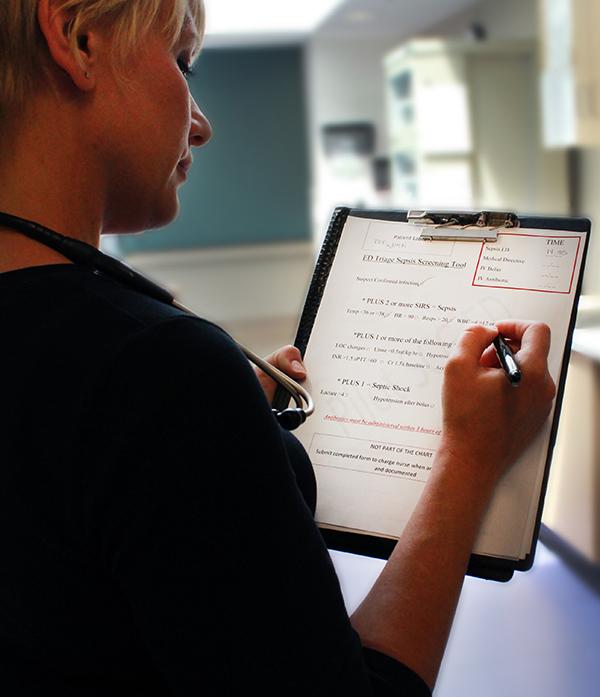The Niagara Health System has become an extension of the classroom by providing a hands on opportunity for medical and health sciences university students to partner in its quality healthcare improvement initiatives.
Staff members of the NHS have been working with teams of students of McMaster University’s Niagara Regional Campus of the Michael G. DeGroote School of Medicine, Brock University’s Community Health Sciences in a joint initiative called I-EQUIP for Interprofessional Education for Quality Improvement program.
 The Niagara Health System is committed to the delivery of high quality care in a safe environment. Increased awareness of sepsis signs and symptoms is among our key quality improvement initiatives.
The Niagara Health System is committed to the delivery of high quality care in a safe environment. Increased awareness of sepsis signs and symptoms is among our key quality improvement initiatives.
Each team, made up of a medical student, a health sciences student and a NHS professional, reviewed best practices currently in place and explored ways to improve upon them.
This year I-EQUIP concentrated on six quality improvement initiatives identified by the NHS through its ongoing quality program, including antibiotic stewardship, insulin safety and infection control as well as teaching self-management of chronic obstructive pulmonary disease and helping to enhance patient satisfaction.
The leads for the project are Linda Boich, NHS vice-president of patient services; Matthew Greenway, a family doctor and associate clinical professor and research lead for the medical school campus, and Madelyn Law, an assistant professor in the department of Community Health Sciences at Brock.
The students recently shared their results to date at a Health Quality Symposium, attended by NHS leaders, community healthcare providers, family physicians, and representatives of the Local Health Integration Network. Some of the findings will be presented at the National Health Leadership conference in Niagara Falls this month.
“The students bring a unique perspective to what we do as a hospital and how we do it, and we find their input to be of great value,” said Linda Boich. “We have a number of quality improvement initiatives in place, and we plan to incorporate this program into our ongoing work to improve patient care and the patient experience at the Niagara Health System.”
Karl Stobbe, regional assistant dean of the medical school, said the fact the students are new to the hospital system is an advantage. “They aren’t burdened by how things always were. The students are able to think outside the box because they’re not yet fully inside the box.”
Law said the I-EQUIP program has potential for growth, adding: “This creates more opportunities for our students to engage in meaningful applied learning activities which also provide value to the health of the Niagara community.”
Eliza Beckett, a fifth year student in health sciences at Brock, said she found the strong interest in the I-EQUIP projects encouraging, adding “as a student this practical experience has given me the opportunity to make real change before I have even graduated.”
The key quality improvement (QI) projects for this year’s I-EQUIP program included:Second year medical student Alannah Smrke said she is glad to help the communities who have helped her training as a medical student. “This project has given me insight on change and it has redirected my focus on how to make improvements happen by starting with the right tools in place. When reviewing clinical problems, instead of getting frustrated, I now look for the opportunity.”
- The Antimicrobial Stewardship project focused on the benefits of moving from IV to oral antibiotics for the patient which is intended to help increase patient satisfaction, early discharge, and treatment cost.
- The Insulin Safety Quality Improvement project focused on the improvement of patient blood sugar control and subsequent reduction in diabetes related health complications.
- Sepsis project focused on how improving earlier recognition of sepsis could help to save lives.
- Chronic Obstructive Pulmonary Disease (COPD) Self-Management Education project focused on assisting patients to become “self-management” experts capable of complying with regimens and accessing the right care at the right time in the right place.
- The Venous Thromboembolism project focused on ensuring that patients are receiving the right medications at the right time.
- The Post Discharge Phone Call project aimed at ensuring patients understand their discharge and medication instructions and are encouraged follow up with their family physicians.
Quality improvement is a continuous process, and Linda Boich says she is pleased that the students will continue working on I-EQUIP quality improvement projects with the NHS. She adds, “This partnership is a tremendous opportunity for everyone involved to be leaders in quality improvement in healthcare.”



For more information or interviews, please contact:
Veronica McGuire
Media Relations
Faculty of Health Sciences
McMaster University
vmcguir@mcmaster.ca
905-525-9140, ext. 22169
Michael T. Armstrong
Communications Officer
Faculty of Applied Health Sciences
Brock University
mtarmstrong@brocku.ca
905-688-5550 ext. 5342
Erica Walters
Community Engagement & Development
Niagara Regional Campus of the
Michael G. DeGroote School of Medicine
McMaster University
ewalter@mcmaster.ca
905-378-5717, ext. 6416
Caroline Bourque Wiley
Manager, Communications
Niagara Health System
905-378-4647, ext. 43113
cwiley@niagarahealth.on.ca

